Omukuri gw’enteguzi (wedding flute) – played by a flautist on a simple notched four-hole flute – when on the day of the wedding the groom’s party arrives within earshot of the home of the bride to be. Recorded by B.K. Mubangizi 1967 in southern Nkore.
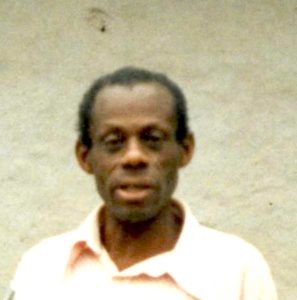
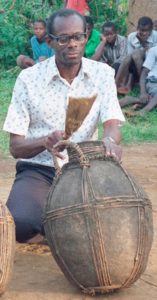
I first met Mubangizi when he arrived in 1966 with a dozen other school music teachers and teacher-trainers for an in-service music course I conducted at Kyambogo National Teachers’ College. He was a quiet man and though he had become a teacher trainer he was largely a self-taught scholar. Unlike his colleagues on the course he was not a very lively participant and seemed permanently tired. When I asked another course member about this I was told that while they were asleep in their dormitory, Mubangizi stayed up busily writing through the night.
I learned that despite ill-health his muse never allowed him to rest. He composed hymns and songs in traditional styles, wrote children’s books and novels, collected and published traditional tales as well as writing historical and linguistic contributions. His hymnbook, Mweshongorere Mukama (‘Let us Praise the Lord’, Kampala, 1961, 6/1987), was adopted for use throughout the diocese and further afield and contains 79 of his own compositions. A second unpublished collection of the same title contains a further 65 settings, including arrangements of Latin, French and English hymns.
When I introduced him to Prof. John Blacking who came for a couple of visits to Uganda to teach at Makerere University and to explore Uganda’s rich musical traditions, John was also impressed and he helped to secured a fieldwork grant for Mubangizi to enable him to explore the traditional music repertory more distant from his own home in Kitabi, Nkore. The flute song at the head of this blog is just one of the many items he recorded as a result.
When in 1968 the Roman Catholic church adopted Mweshongorere Mukama for its chief musical liturgy, Mubangizi was asked to introduce and to teach his hymns to Catholic choirs throughout Western Uganda.
Being conscious of the need to always make use of traditional Ugandan musical styles, he enjoined users not to introduce harmonies other than those produced by overlapping refrains in some of the hymns, for he had carefully preserved the traditional relationships between speech tone and melody when composing his hymns. He was acutely conscious of the nonsense that can be produced produced when Runyankore texts are simply added to European harmonised hymn tunes. Such a practice had nevertheless become common for all denominations throughout Uganda.
The following example illustrates Mubangizi’s style well. Here he uses the rhythm tapped out on large pot-drums to accompany voices where the overlapping choral refrains (voices 2 and 3) remind one of the low sounds made by cattle. The song adopts the style of the ekitaaguriro men’s dance which likewise begins with the men responding to the recitation of a soloist with low sounds before the they rise to their feet and individually stamp out out rhythms accompanied by a flute, pot drums and rattles.
Enyonga zaija niitara.
This abbreviated performance differs slightly in places from Mubangizi’s score which is typeset below.
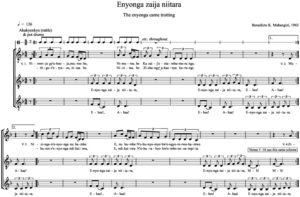
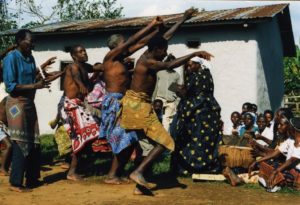 Members of the Kitabi ‘Musilit’ organisation perform the ekitaaguriro dance, (1987). The foot stamping along with the raised arms (reminding one of the long horned cattle raised by the Banyankore) demonstrate their affection for their beasts.
Members of the Kitabi ‘Musilit’ organisation perform the ekitaaguriro dance, (1987). The foot stamping along with the raised arms (reminding one of the long horned cattle raised by the Banyankore) demonstrate their affection for their beasts.
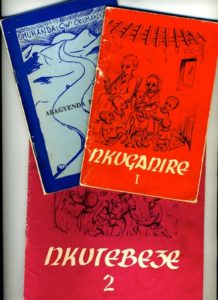
Three of Mubangizi’s many little books of tales and poems for children.
When I visited his home in 1987 and 1988 Mubanizi arranged for me to meet a number of the best exponents of Nkore’s traditional arts and record and film the parish choir and other performers in his Musilit organisation.
One of the many hymns sung during meeting was this Easter carol below. The 5/4 rhythm is a rhythm traditionally used for some dances.
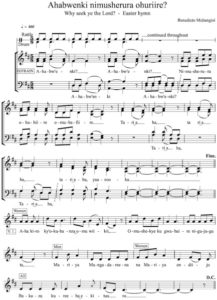
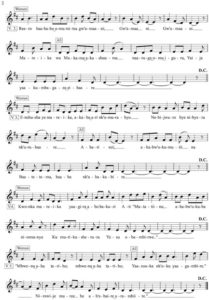
Translation:-
Why seek ye? Why seek ye the living among the dead.
He is not here, He is not here, He is not here, He is risen.
As it began to dawn towards the first day of the week,
Mary Magdalene and the other Mary came to see the the sepulchre.
And behold there was a great earthquake:
For the angel of the Lord descended from heaven and rolled back
the stone from the door and sat upon it.
His countenance was like lightning , and his raiment white as snow:
And for fear of him the keepers did shake and became as dead men.
And the angel said to the women, “Fear not; for I know
That you seek Jesus, who was crucified.
He is not here: He is not here. For he is risen as he said.
Come and see the place where the Lord lay.”
Hello, I am so glad for the above information(blog), it’s going to help me in my research. Thanks very much I know he lives as a saint.
thanks for your comment, Tumusiime – it is appreciated. I’d be interested to know what your research is and how you are approaching it. Peter.
Hello,
This is Tumusiime Francis grand son to BKMubangizi. Here is my email [email protected] where I can share you my research content thanks so much.
God bless you.
Nice
However much the information written about him seems to be much, it can’t fully describe him. But much more information could be written to enable the young generation learn more from and about him.
Information about his teachers is also left out. It is said that one of his teachers is Rev Fr Piet Van Spaandonk and this priest was buried at Mushanga Parish cemetery.
Am also interested in anyone who has any research about this outstanding man and the software of his traditional books and tales.
Could you share your research with me at [email protected]
Thank you
Thanks alot for telling my grand father’s story. We as the family we do appreciate for this article, at least someone have given the world a story about this great man that we couldn’t equal. Thanks again.
Thanks for this comment Busingye. It’s appreciated – but then BKM deserved what I had to say. If you however noted anything not quite correct do let me know. BKM’s own flesh and blood know more that I could ever know about the great man.
Please greet all the family for me. I hope to stay in touch though I’ll never be fit enough now to make another journey to Uganda – let alone Kitabi. But I have such good memories of kind hospitality and cooperation shown towards this musungu.
It’s so nice. I remember by then I was acting as a budding poet.
Hi Busingye, is there any email I can contact you on? I have a question about a recording your grandfather did, I would like to see if you had any information about it. Thank you.
[email protected]
I was still young and read BKM book Abagyenda bareeba. Unfortunately, I looked for it anywhere and couldn’t find it later. I wish I could get leads to a library where I can get it in Uganda.
I would really appreciate.
Talk about it I read that book for as many times as could remember, these are the folklore that kept out culture, they kept us as a unit and morally upright, I cherish the olden days. Thanks to Mubangizi
We are on 22/ 6/2024 this year celebrating BKMubangizi’s life at the Parish level. Kitabi Parish will be the Host.
See you then.
Abagyenda bareba can be got At Uganda martyrs university kabale library
Hello,
Each time I read your articles on the blog I get touched of our grandfather’s work and concern to continue it. As I earlier said, I am doing research and I would like to contact you.
Here is my email [email protected]
Thanks
God continue to bless you for the work you are doing for BK Mubangizi family.
On a sad note we lost our grand mama (the wife) last year in January
Mubangizi was my grand Father and mentor. I learnt alot from him.
I have read alot of BKM stories and I am amazed at his capabilities as a writer and artist. There’s certainly no equal to his great works to share the Runyankore language and culture. I am so glad to learn about his musical works. What a man! May his soul rest in peace.
I also participated in some folk songs,poems and so on
he was my Ankore long recititation teacher.
Tumusiime, i need your contact
I was still young and read BKM book Abagyenda bareeba. Unfortunately, I looked for it anywhere and couldn’t find it later. I wish I could get leads to a library where I can get it in Uganda.
I would really appreciate.
[email protected]
Great works by a man that dedicated his life to tell the tales in the Runyankole language and quite many from our area of Kitabi-Ibaare.
As a young boy growing up in Ibaare village, I chances upon a number of books by the great BKM in my father’s home library, and my favourite is Nkutebeze which contains a number of educative stories, some from the ankole/nkore folklore.
I am so impressed by Benedicto Mubangizi. He is my mentor and role model yet I have never seen him face to face. I have analyzed his musical works more than five times and I don’t find his equal. He paved way and made the foundation for the music arrangements used in almost all Western Uganda. His poetry and context arrangement especially in the songs are so interesting. Singing a church song composed by Benedicto Mubangizi truly nourishes the soul and brings one’s thoughts close to God.
I believe he is a Saint of God because his works give testimony and his contribution is evident.
I am also a young composer, trotting in his footsteps and inspired by his works. So far, I have 235 hymns compositions approved to be used by the church.
I believe B.K. Mubangizi had many more songs that were note notated into staff notation. We need to find ways of writing them because we can still retrieve many of them.
(Bazilio Arinda)
I like your work too it’s really good though I still have challenges in harmonizing.
I have none approved by the church but have alot of compositions that may need your help in harmony.
God bless you!
It’s wonderful
Great Thanks and blessings to the late B.K Mubangizi and his family.
Am an ardent admirer of his books…and am interested in his works.
B.K Mubangizi, the great Ankole man, that lived his times, he will be remembered and his name emblazoned on the Hall of Fame” among many Banyankole enthusiasts, i really love his books, he will be remembered forever. I have project plan of archiving and restoring all Ankole artifacts, tales, books.
I will get in touch with the family. Am very happy to have this conversations with you. Thanks
It would be nice work, oh!
Special thanks to you Dr. Peter Cooke for this article. I am so happy you sacrificed your time and made research to let the world know about the late BK Mubangizi. I didn’t get a chance to see my grandfather but because of him, I have lived to love the Catholic Church, fear and serve God. May his and grandmother’s souls continue resting in peace
Once again thank you Dr. Peter Cooke for this article
It’s today 24/04/2024 when I remembered this great church hero. At first I thought he’s still alive. Little was shared about his life when we were still young.
Old catholic hymn books (eg TUHIMBISE MUKAMA – let’s praise the lord) would put the name of the author at the end of the song, but current editions are slowly neglecting that Copyright demand.
Am really amazed to read this brief script about BKM the great
Iam glad to get hold of this information about a great man of Uganda, hailing from Kitabi,
When l was growing up in Ibaare village next to Kitabi, my father bought many us, many story books about BKM amoung that l remember was , Abagyenda Bareba, Nkutebeze, and ishekatabazi.
We would read these books at home and even when we go to graze animals, because they very interesting we would forget about animals, and they stray most times.
Indeed l can’t equal BKM.